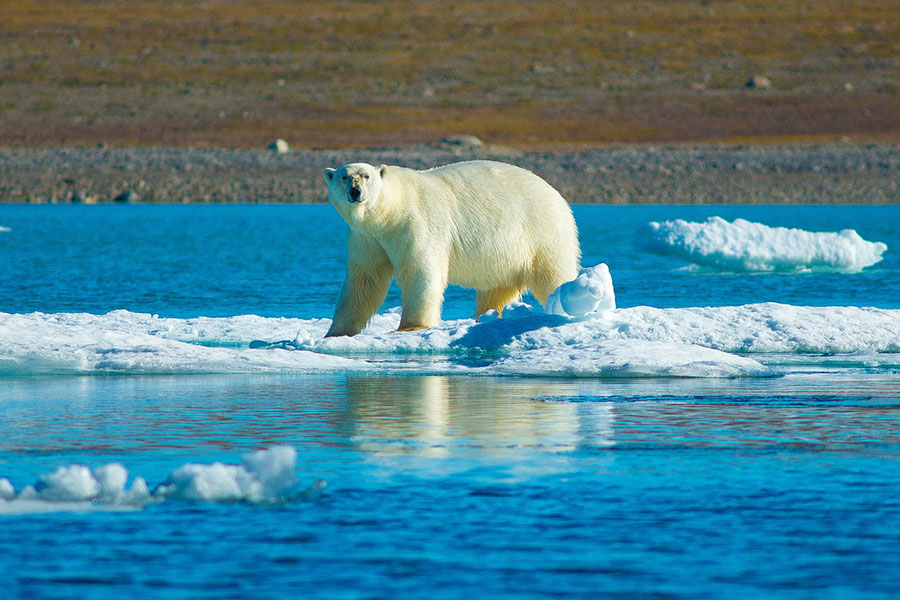 July 30, 2019 — CSU Channel Islands (CSUCI) senior Nik VanKeersbilck had just completed a long research shift on board the Swedish icebreaker Oden, so he was relaxing on the bridge, gazing out over the floating ice for wildlife.
July 30, 2019 — CSU Channel Islands (CSUCI) senior Nik VanKeersbilck had just completed a long research shift on board the Swedish icebreaker Oden, so he was relaxing on the bridge, gazing out over the floating ice for wildlife.
He had spent five hours looking for polar bears and was about to give up when one of the officers spotted one — the first one of the 2,000 nautical mile expedition. Then another and another.
“We saw three in total in just a couple hours,” VanKeersbilck wrote in an email. “That was very special to me. These animals are majestic and just wonderful to observe. Even while writing this email, we saw another polar bear!”
VanKeersbilck is one of four CSUCI undergraduates of different science, technology, engineering, math (STEM) majors on the Northwest Passage Project expedition, an 18-day, 2,000-nautical-mile research journey through the Arctic Ocean to research the effects of climate change.
The other three students are: Korenna Estes, Melvin Kim and Triston Millstone. The CSUCI undergraduates are among 25 student researchers from Minority-Serving Institutions in the U.S. and Canada.
VanKeersbilck carries a double major in Biology and Chemistry with a minor in Computer Science. Estes and Millstone are both Biology majors and Kim is an Environmental Science & Resource Management major.
“Researchers all over the world are counting on the data we are collecting to create accurate climate predictions and models,” said VanKeersbilck, who is researching ocean chemistry. “People often view the arctic as distant and unimportant to their everyday lives, but in reality, what it happening here is of great significance to everyone in the world.”
Led by the University of Rhode Island Graduate School of Oceanography and funded by the National Science Foundation (NSF), the Northwest Passage Project (NPP) is a collaborative effort between the University of Rhode Island (URI), Inner Space Center (ISC), the Graduate School of Oceanography (GSO), the film company, David Clark, Inc., and several other collaborators, including CSUCI and four other U.S. universities that are classified as Minority Serving Institutions (MSIs).
The students and scientists from several universities and museums are collecting samples of water, ice and air in order to study the impact of climate change on the environment and biodiversity in the Canadian Arctic Archipelago.
“It is important for people everywhere on earth to see and understand how this region affects all of us,” says NPP principal investigator and project director Gail Scowcroft. “The region’s meltwater, water circulation, and exchange of greenhouse gases between the ocean and the atmosphere are causing wide-scale environmental and climatic changes, which increasingly affect people and wildlife diversity around the world.”
CSUCI Professor of Biology Amy Denton, Ph.D. is the faculty advisor for the CSUCI students on the expedition, which began July 18 and lasts through Aug. 4.
The NPP organizers contacted Denton three years ago as they wanted to include students from a minority-serving institution with someone on faculty with expertise in the Arctic. The Arctic has been Denton’s primary area of study for decades. She loves the diversity and beauty of the frozen wilderness and she understands how critical the area is in terms of signaling what’s ahead if we don’t address climate change.
“The Arctic is changing first and fastest,” Denton said. “It’s the canary in the coal mine. In addition to melting glaciers and sea ice, permafrost is also melting rapidly, releasing the greenhouse gas methane into the atmosphere. Also, as land and sea ice disappear, less heat is reflected back into the atmosphere, driving even faster warming.”
The glacier melt also reduces ocean salinity which, together with warming water, can disrupt the deep ocean circulation “conveyor belt” Denton explained, adding that this can cause dramatic shifts in major ocean currents, global weather patterns, and ocean nutrient cycling, which, in turn, impact marine life and food webs worldwide.
The students on board the Oden are researching marine birds, microbial diversity, and the physics and chemistry of the ocean.
The students disembarked the ship to visit the Inuit community of Pond Inlet and later, Beechey Island in the Canadian Arctic to visit three graves of an ill-fated 1845 expedition led by Sir John Franklin. Franklin was an explorer searching for the Northwest Passage, a direct route from the Atlantic to the Pacific Ocean.
The students also were part of regular live, interactive broadcasts from the ship to viewers all over the world. The project will also be the subject of a two-hour television documentary in 2020 called “Frozen Obsession” produced and directed by Emmy Award-winning director David Clark.
For more on the project, visit: https://northwestpassageproject.org/.
